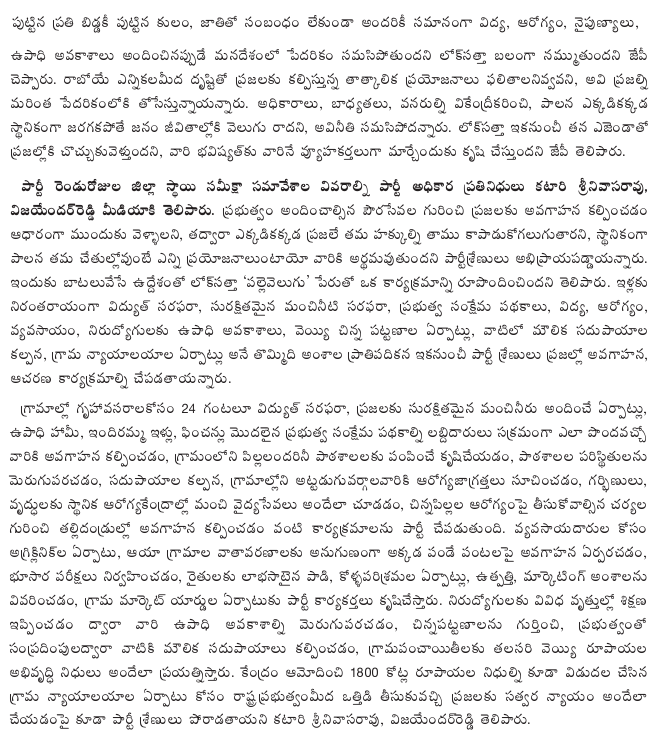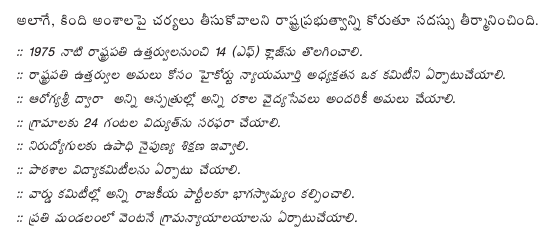Press Releases Archive
Lok Satta to develop 50000 active citizens
Wiser from experience, the Lok Satta Party has decided to follow a different track to realize its dream of changing the nature of politics, announced its President Dr. Jayaprakash Narayan here today.
Addressing the media at the conclusion of a two-day meeting of party’s district leaders, Dr. JP pointed out that although people appreciated the Lok Satta agenda they fought shy of voting for it in elections for two reasons. The first is the reluctance of middle classes, the educated, and the youth and all those who have resources and leadership qualities to shoulder the responsibility of transforming the nature of politics. The second is the first-past-the post electoral system in which a vote to other than mainstream parties is regarded as a wasted vote.
The Lok Satta Party, Dr. JP recalled, had come into existence not to be merely in the race for a market share in the votes. The party always viewed power as a means and not an end in itself.
Unless citizens realize that they are the masters of their destiny and that the vote in their hands is a means to realize their hopes and aspirations, the nature of politics cannot be transformed. Unfortunately, large sections of people choose to keep away from the polling booth abhorring and cursing politics, which has become a lucrative business for certain individuals or dynasties.
Dr. JP said that the Lok Satta Party therefore has decided to educate, enlighten, and awaken citizens as to how they can look forward to a new dawn in their lives only by taking active part in politics and not by shunning it. As a first step, the party plans to recruit and train some 50000 people from all over the State in the next four years as active citizens. They will be helped to identify local problems and resolve them with their active participation. Similarly, in urban areas the citizens will be educated on the need for and importance of ward governments for better utilization of available resources.
Dr. JP said that the party also planned to reach at least five big villages in each mandal of the State within one year with a 10-point agenda, which aims at educating the public on the link between politics and their lives.
The Lok Satta Party firmly believes that poverty will not vanish unless every child irrespective of its accident of its birth in a certain caste or religion or class is provided quality education and health care, livelihood skills and employment opportunities. Sops provided to the poor with an eye on the next elections will merely perpetuate poverty and not make people self-reliant.
It believes that without decentralization of powers, resources, and personnel through governments at the ward level both in urban and rural areas and empowerment of people, there would be no improvement in people’s lives or an end to corruption.
Dr. JP said the party would hereafter focus on galvanizing people with its agenda and help them take charge of their future.
Briefing the media on the two-day conference of district leaders, party spokespersons Katai Srinivasa Rao and V. Vijayender Reddy said the party would launch ‘Palle Velugu’ to educate people on availing themselves of Government schemes like pensions, Arogyasri, and Indiramma houses. It will enrol children in schools and improve schools’ infrastructure. It will help the unemployed find livelihood and employment opportunities.
The party will fight for 24-hour power supply in villages, safe drinking water supply, formation of agri-clinics, constitution of village courts, development of small towns, and institution of per capita grant of Rs.1000 to local governments in both rural and urban areas.
The conference adopted resolutions requesting the State Government to
- Get Clause 14 (f) deleted from the Presidential Order of 1975
- Appoint a committee headed by a High Court judge to implement the Presidential order
- Tweak Arogyasri to extend health care to all in all hospitals
- Provide 24-hour power supply in villages
- Provide job-oriented skills to the unemployed
- Constitute school education committees and
- Give representation to all parties in ward development committees.
Adopt schools, Dr. JP tells College students
Lok Satta Party President Dr. Jayaprakash Narayan today called upon like-minded groups of youngsters in colleges to adopt a primary school or two in their neighborhood and take up mentoring of students. “It will be a win-win deal for students in both colleges and schools.”
Dr. JP said that college students rendering such service as part of NSS (National Service Scheme) could be given credits in college and weightage in admissions to institutions of higher learning.
Addressing the media on the Right to Education Act, effective from April 1, Dr. JP said the Lok Satta welcomed the Act wholeheartedly although it had not come a day soon. As the Prime Minister himself recalled, Gopalakrishna Gokhale had requested the Imperial Assembly to confer the right to education on Indians 100 years ago. Japan had become prosperous and powerful because it conferred the right to education 110 years ago.
Dr. JP said India had a surfeit of laws made by well-meaning people. “Unfortunately, we are always long on intent and short on execution.” If the Right to Education Act were to serve its purpose, the Government should straightway increase the allocation of funds from Rs.25000 crore in tune with the requirement of enabling a crore of children to attend school. “After all, the Union Governments and State Governments are squandering tens of thousands of crores on giveaways in the name of serving the poor. While such giveaways make people dependent on Government, education makes them stand on their own feet with dignity.”
Dr. JP underscored the need to build infrastructure as the Government implemented the Act. The Andhra Pradesh Government, for instance, spends Rs.2300 crore on scholarships and fee reimbursement but does not bother to spend less than Rs.50 crore on providing toilets and drinking water facilities in schools.
Dr. JP said that more important than allocation of resources and provision of infrastructure is delivery of services. Going by the Annual Status of Education Report, 30 to 40 percent of seventh class students cannot read and 60 to 70 percent of them cannot do a simple arithmetic sum like division. The Act will not serve its purpose if it succeeds in merely enrolling children in schools. Institutional mechanisms like district and city boards to monitor and improve teaching standards should be made. The boards can provide incentives and promote competition among schools. Fifty percent of members of such boards should be experts in education.
The most vital characteristic of a modern, civilized society is to ensure that every child, irrespective of the accident of the womb, has an opportunity to fulfil her true potential. If that central purpose of politics and governance is forgotten in our quest for captive vote banks, we become traitors to the nation. This is cause beyond partisan politics and parties. This is our national mission.
Dr. JP said education is too serious a subject to be left in Government hands alone. Everybody including civil society organizations, industry and business should strive to improve the quality of education so that India too becomes a super power in the 21st century.







